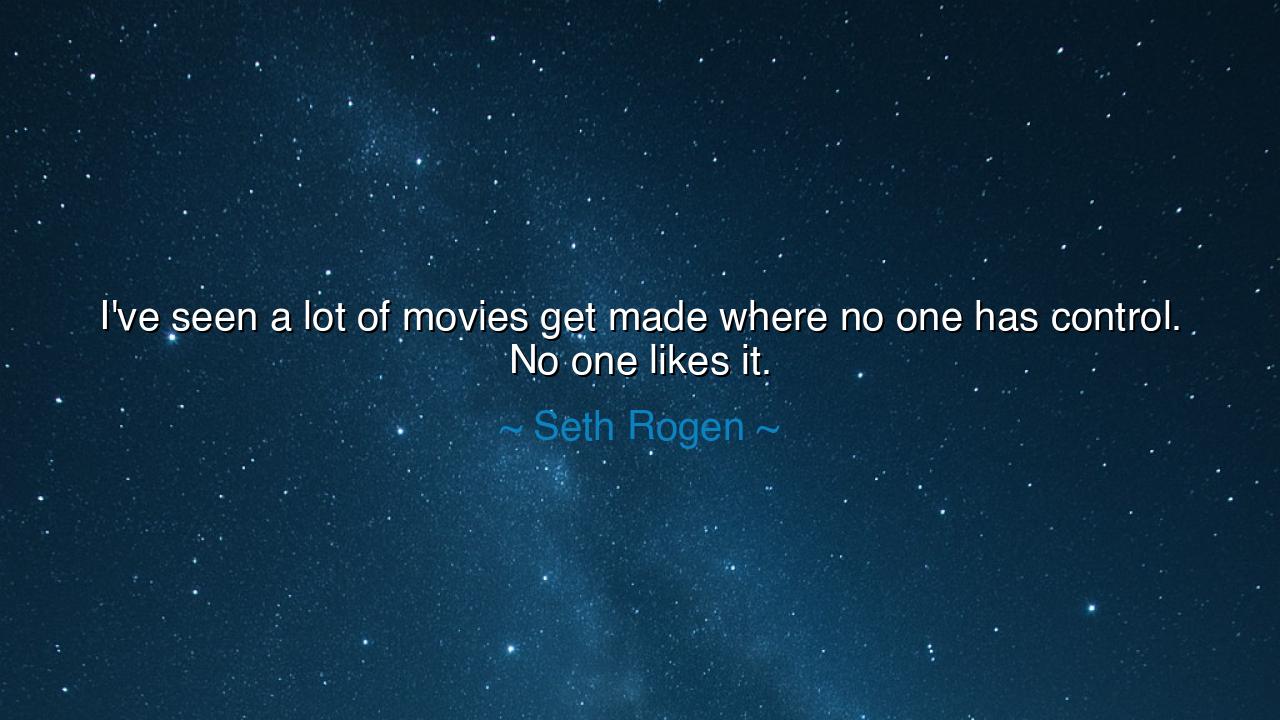
I've seen a lot of movies get made where no one has control. No






Hear this, O seekers of wisdom, for in the words of Seth Rogen lies a profound reflection on the nature of control, collaboration, and the delicate balance needed for true creativity to flourish. He spoke thus: "I've seen a lot of movies get made where no one has control. No one likes it." In these words, Rogen speaks not just to the world of film, but to the nature of creation itself—how chaos without direction, without a clear vision, leads only to frustration and disappointment. Creation is not an act of mere random strokes; it requires focus, purpose, and a sense of leadership that guides all involved toward a unified goal. When the hands that shape the project are without control, when the vision becomes scattered and lost, the work falters, and the result is hollow.
In ancient times, the builders of great cities and temples understood this truth. Consider the construction of the Parthenon in Athens—a magnificent creation that symbolized the unity and strength of the Greek people. The master builders and architects did not allow chaos to guide their work. Every stone was laid with purpose, each design carefully planned, each worker given a task with a clear vision in mind. Without this control, the Parthenon would have never stood as a symbol of the ancient Greek civilization, nor would it have inspired awe for centuries to come. The work was not merely a matter of labor—it was a vision realized, a vision that required every hand to follow a single guiding principle. Rogen’s reflection on the lack of control in some productions mirrors this ancient wisdom—great creations require control and clear vision, for only in this way can they reach their fullest potential.
The same can be said of the ancient Greek tragedies, written by playwrights such as Sophocles and Euripides. The tragedies were not written by a single mind wandering aimlessly, but through careful crafting, each word and each line imbued with purpose. The actors, the chorus, and the director (or playwright) all worked in harmony, with each individual contribution enhancing the whole. Without control, without a central guiding force, the tragedies would not have had the emotional power or the philosophical depth that they continue to offer us today. Rogen’s words remind us that true art is not birthed from disarray, but from the focused efforts of all involved, each playing their part toward a singular goal.
Control, however, does not mean tyranny. The wise leader, be it the director of a film or the ruler of a kingdom, understands that true control is the ability to guide, to unify, and to empower the team, not to dominate them. In ancient Rome, Julius Caesar was not simply a conqueror; he was a leader who understood the importance of control in both battle and governance. But he also understood the need for collaboration—he did not demand blind obedience but worked with his generals to craft strategy, to share knowledge, and to execute plans with precision. Caesar’s leadership, though authoritative, was ultimately about empowering his army and allowing them to thrive within the structure he provided. Rogen’s reflection, in this sense, is about the need for leadership and structure, not chaos, in any creative endeavor.
Consider, too, the great composer Ludwig van Beethoven, whose symphonies were not created in a vacuum. Though he composed some of the most transcendent music in history, he required the precision of musicians, the discipline of the orchestra, and the vision of a conductor to bring his compositions to life. Beethoven, though the creator of the symphony, understood the importance of each individual’s contribution. Without the control to guide the performance, the symphonies would have remained as mere notes on a page—untested, unrealized. In the same way, Rogen’s words remind us that in any great creative work, there must be a guiding vision, a force of control that allows each individual’s talent to shine without overwhelming the collective harmony.
The lesson for us all is clear: Creation is not a wild, uncontrolled force. Whether we are making a film, building a business, or crafting a work of art, we must understand that without control, the result will not reflect our true potential. Control does not mean oppression, nor does it stifle creativity. Rather, it provides a framework within which each individual can express their unique gifts and talents, allowing the creation to flourish in ways that would be impossible in chaos. Rogen’s words serve as a reminder that the most powerful works—whether in film, art, or life—are those that have a clear sense of direction and purpose.
So, young ones, take this lesson to heart: In all creative endeavors, seek to establish control over the process, not as a tool of domination, but as a means of guiding the collective vision to its fullest potential. Find your focus, rally others around a singular purpose, and allow each individual to contribute their best to the whole. In this way, you will see that the work you create will not only reach its potential but will rise to become something greater than you ever imagined.






AAdministratorAdministrator
Welcome, honored guests. Please leave a comment, we will respond soon